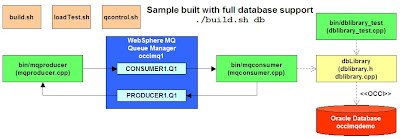A couple of key things demonstrated:
- C++ (OCCI) Oracle database access
- Transparent Application Failover (TAF) notifications in C++ (OCCI)
- Building a C++ application with MQ and OCCI support
- Using makefile flags to build either with full or a "stub" database library class
The diagrams below give a simple exposition of how the demo is structured. The executables "mqproducer" and "mqconsumer" are MQ clients shuttle messages back-and-forth via queues. For each message sent by "mqproducer", a reply is expected from "mqconsumer". The readme.txt in the archive contains fairly detailed coverage of how to run the demo.
If the sample is built with full database support, then a "dblibrary" is linked in that will persist each message to database (and the dblibrary_test program can be use to test the operation).
 If the sample is built with a database "stub", then a dummy database library is substitued, and the programs a built without any Oracle Database support linked in at all. This can be useful when just wanting to focus on the MQ aspects in isolation.
If the sample is built with a database "stub", then a dummy database library is substitued, and the programs a built without any Oracle Database support linked in at all. This can be useful when just wanting to focus on the MQ aspects in isolation.










No comments:
Post a Comment